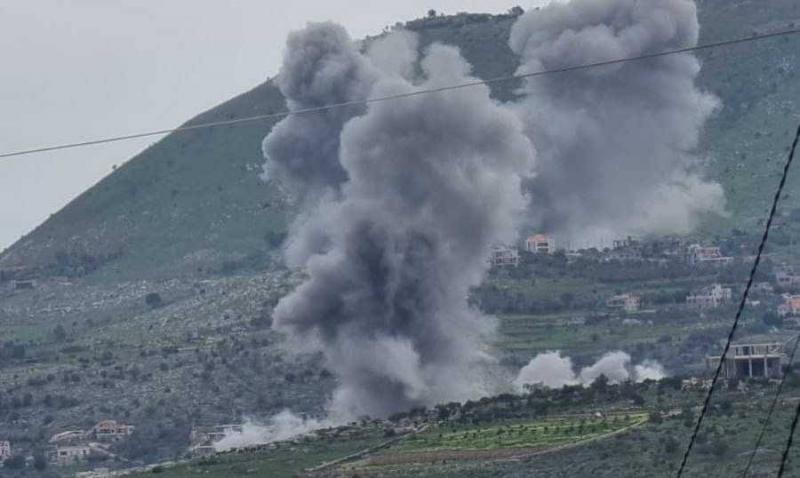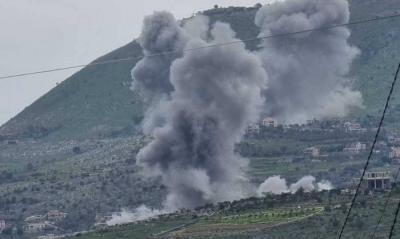The Deputy Secretary-General of Hezbollah, Sheikh Naeem Qassem, acknowledged a change in the performance of the party's fighters on the front in southern Lebanon, announcing adjustments to achieve a significant accomplishment. The party has been fighting Israel along the southern Lebanese border since October 8, one day after the launch of the Al-Aqsa Flood operation in Gaza. Hezbollah initiated an operation to support and assist the resistance in Gaza, which later morphed into a war of attrition along the southern Lebanese border. This transformation has turned villages along the border into war zones, leading to massive destruction and significant loss of life, nearly matching the party's casualties in the comprehensive war it fought with Israel in 2006.
This shift comes after the party recently moved away from the policy of restraint that it maintained for months to avoid being drawn into a broader war that Israel sought, to a strategy of maximum pressure, coinciding with the Israeli army's control over the Rafah crossing and its readiness to invade the city. While confrontations continued in the south of the country on Saturday, albeit at a lower intensity than in previous days, Sheikh Qassem questioned in a speech during a ceremony in Beirut on Friday: "Haven't you noticed how the performance has changed on the southern front, and how our Mujahideen brothers have benefited from lessons learned and from modern tactics implemented?"
He added: "In all wars in the world, when a war ends, the positives and negatives are studied, and the negatives are addressed for the next conflict. We studied the positives and negatives from the first two months and made the necessary adjustments to ensure a significant achievement, and this is what has occurred from the Mujahideen."
### Casualties of Hezbollah from 2006 to Today
While sources close to Hezbollah reported that the number of fighters who died in the ongoing war in the south since October 8 approached 300, the Lebanese Ministry of Public Health announced registering 1,413 injuries, including 351 deaths, resulting from the ongoing Israeli aggression against Lebanon. According to researcher Mohamed Shams al-Din from the International Information Institute, in the July 2006 war, which lasted 33 days, 1,267 civilians and 350 Hezbollah fighters were killed, in addition to several members of the Lebanese army. In the current war, 290 Hezbollah members and 57 civilians have been killed. Shams al-Din stated to "Asharq Al-Awsat": "There were also reports of 19 fighters from the Amal Movement and the Islamic Health Authority, 4 from the Resala Scouts affiliated with Amal, 5 fighters from the Islamic Group, 7 paramedics from the group, 1 member of the Lebanese army, 1 from the Syrian Social Nationalist Party, in addition to 8 Syrians and 8 Palestinians."
Many believe that the current battle, which Hezbollah insists is a supportive and assisting battle for the Gaza Strip, and is practically confined to a specific geographic area, despite some transgressions, unlike the 2006 war that was an open war lasting 33 days and extended throughout all of Lebanon. In March of last year, on the 150th day of the war, Hezbollah published a summary of its operations against the Israeli army since October 8, 2023. Hezbollah's military media reported that during this period, it conducted 1,194 attacks against Israel, indicating that Israeli human losses exceeded 2,000 killed and wounded.
### War of Attrition
Retired Brigadier General Dr. Hisham Jaber, head of the Middle East Center for Strategic Studies, points out that in 2006, the American side did not support Israel in continuing the war, as the latter realized it could not continue because it was unable to achieve its objective of breaking Hezbollah. He noted that at that time, there were 6,000 professional fighters waging war, plus 10,000 affiliated with it, while currently, those numbers have increased significantly. Since then, Hezbollah's capabilities have increased dozens of times, even as Israel has built on its previous experiences and strengthened its military power.
Jaber considers in a statement to "Asharq Al-Awsat" that the ongoing war is a war of attrition. Hezbollah initiated the conflict and became embroiled in it, making it unable to comply with Israeli demands and conditions, as doing so would harm its image before its supporters and Lebanese citizens, leading to no benefit other than to continue resisting.
He added: "However, we should not forget that the party has revealed only a small percentage of its arsenal, whether it be air defense, naval defense, or precision missiles, which are believed to number around 10,000. It is also noted that the Redwan forces have not yet mobilized, in addition to the fact that there is no interest for Israel in a ground invasion of Lebanon, especially since Hezbollah has gained combat experience in its war in Syria, and it can endure because its environment is different from the Israeli environment, which does not accept large numbers of displaced persons and the disruption of all aspects of life in the north, in addition to the Israeli army's alertness for seven months."
### Outlook of the Battle
On her part, former UN diplomat Brigitte Khair stated that the outlook for the battle to the south has begun to clarify with the failure of initiatives aimed at limiting military operations and Hezbollah's retreat to the Litani River, alongside the phased implementation of UN Resolution 1701. She pointed out in a statement to "Asharq Al-Awsat" that the failure of these efforts foreshadows the possibility of an expansion of Israeli bombardment and strikes, with the looming danger to Lebanon, which is politically paralyzed and exposed to security threats, as evidenced by the rampant militias of various affiliations in the south, reminiscent of the "Fatah Land" scenario in the 1980s that led to Israel's invasion of Lebanon in 1982.
Khair believes that the possibility of restraining armed elements outside the control of the crumbling state remains feasible, despite its difficulty, to prevent any Israeli action that could use these attacks from Lebanon as a pretext to widen the war, emphasizing the need for the caretaker government to respond to international and regional efforts with more sober and sovereign stances.




